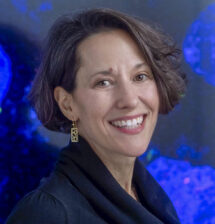
Brenda Schulman will deliver the 2019 John Kendrew Lecture: ‘How a ubiquitin-like protein brings ubiquitylation to life’ on Thursday 3rd October at 10.30am in the LMB’s Max Perutz Lecture Theatre. The event is open to anyone in the local area who is interested in attending.
Brenda’s group at the Max Planck Institute integrates biochemistry, structural biology, chemistry, biophysics, genetics and cell biology to decipher signalling by ubiquitin and structurally-related ubiquitin-like proteins, UBLs. The group’s goals are to define fundamental mechanisms underlying how dynamic, multiprotein assemblies called “molecular machines” match particular forms of ubiquitin and UBLs with their specific cellular targets, and to elucidate how ubiquitin and UBLs remodel the structures and switch the functions of their targets to regulate cell division, protein trafficking, metabolic signalling and autophagy.
Brenda received her PhD from MIT before doing postdoctoral work at MGH Cancer Center, Boston and at Memorial Sloan-Kettering Cancer Center, New York. In 2001, she joined the faculty at St. Jude Children’s Research Hospital, Memphis, where she retains an adjunct faculty position. She was an HHMI Investigator and the Joseph Simone Chair in Basic Research at St. Jude until July 2017, when she moved to the Max Planck Institute of Biochemistry, where she is a Director and Scientific Member. She has won a number of awards including the Leibniz Prize and the Ernst Jung Prize in Medicine, and is a member of the American Academy of Arts and Sciences, the National Academy of Sciences, and EMBO.
Lecture abstract:
A predominant form of eukaryotic regulation involves post-translational modification by ubiquitin and UBLs. Understanding how ubiquitin is linked to targets by the large family of enzymes known as cullin-RING E3 ubiquitin ligases (CRLs) is of utmost importance. Members of the large family of CRLs are responsible for ≈20% of all cellular ubiquitylation, regulate virtually all eukaryotic processes, and serve as one of the hottest drug discovery platforms in pharma and biotech. The more than 250 human CRL family members regulate processes including the immune response, transcription, signal transduction, cell division, cell death, development, numerous facets of neurobiology, circadian rhythms, etc. Many CRLs are mutated in diseases, including cancers, heart diseases, and developmental disorders. A variety of CRLs are usurped by HIV to suppress immunity and promote infectivity. And through the revolutionary treatment of multiple myeloma by CRL modulatory drugs such as Pomalidomide, CRLs are the focus of a billion-dollar drug discovery effort aimed at developing “molecular glues” or “PROTACs” eliciting ubiquitylation of disease-causing proteins. In addition, hundreds of CRLs in other organisms such as plants are responsible for vast biological regulation.
Numerous facets of CRL activation – from E3 ligase assembly to catalysis of ubiquitylation to subsequent processing of ubiquitylated substrates – depend on the dynamic linkage and removal of the distinctive UBL NEDD8. NEDD8 is nearly 60% identical to ubiquitin, yet it predominantly regulates CRLs. In my talk, I will describe our findings that reveal the marvellous ways NEDD8 uniquely brings CRLs – and 20% of all ubiquitylation – to life.
Background information:
The John Kendrew Lecture is named in honour of LMB Nobel Laureate John Kendrew. It is one of a series of named lectures organised by the LMB and given by eminent scientists from around the world.
John Kendrew was born in Oxford on 24th March 1917. He studied chemistry at Trinity College, Cambridge and graduated in 1939. During World War II he worked on radar for the Air Ministry Research Establishment. In 1946 he returned to Cambridge and joined Max Perutz at the MRC ‘Unit for Research on the Molecular Structure of Biological Systems’ (now the MRC Laboratory of Molecular Biology) where his research focused on protein structure and the X-ray analysis of myoglobin. In the 1960s John jointly founded the European Molecular Biology Organisation (EMBO) and helped create and was first Director of the European Molecular Biology Laboratory (EMBL). He also founded and was Editor in Chief of the Journal of Molecular Biology. From 1981-1987 he was President of St John’s College, Oxford. He died in Cambridge on 23rd August 1997.
Further references:
Brenda Schulman’s group page
Poster for the John Kendrew Lecture
John Kendrew Biography
LMB Named Lectures